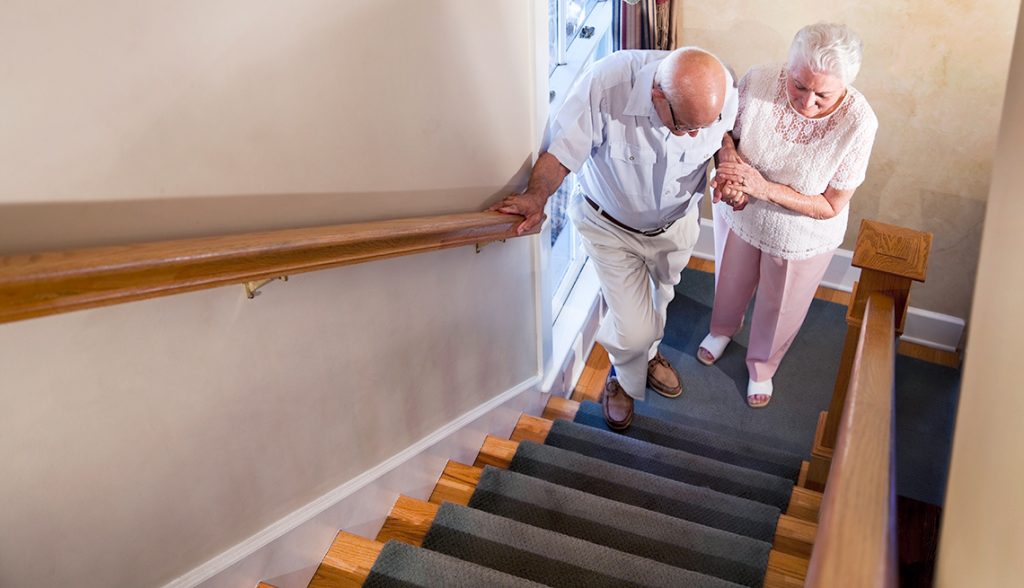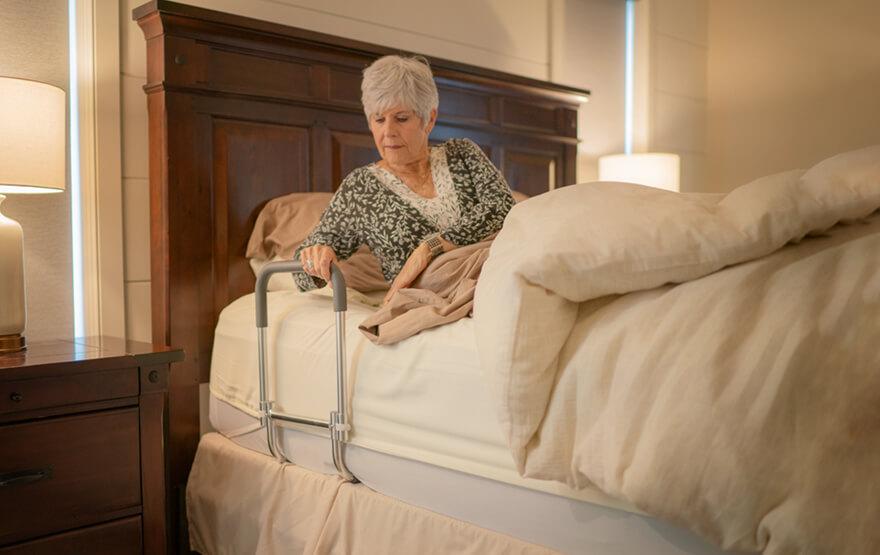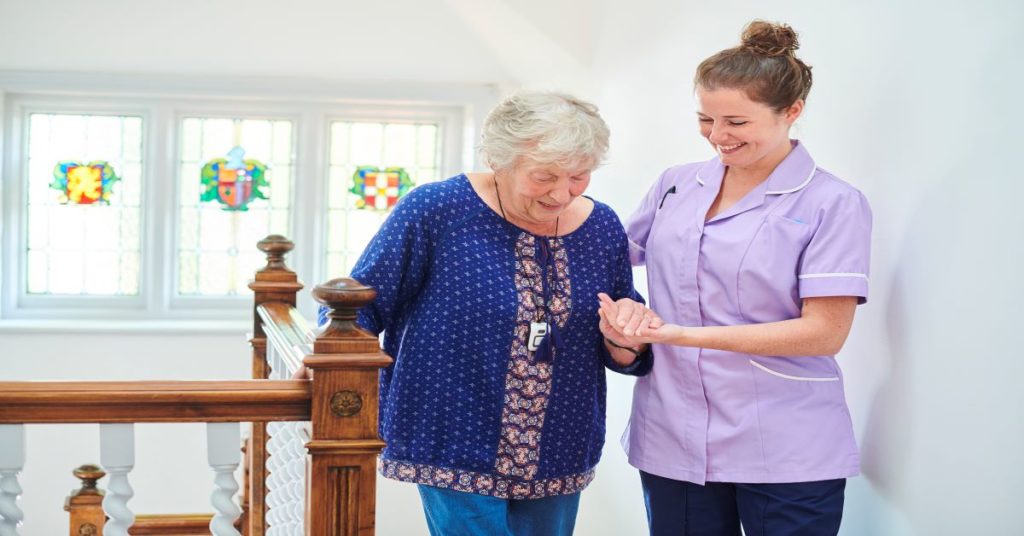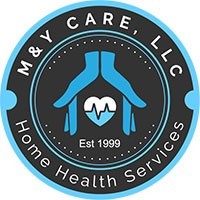
by Vikram Makhija | Oct 23, 2021 | Blog |
It’s no secret that as we age, our homes need to change. We may not be able to reach things like before or want to do some of the work around the house. Luckily there are plenty of ways you can make your home safe for aging parents, and it doesn’t have to cost much! Here are eight easy steps you can take today:

1) Remove everything from low shelves so there is more room for people who can’t bend down easily.
2) Install handrails on both sides of any stairs in your home (even if they don’t lead anywhere).
3) Make sure all electrical cords are out of walkways or secured with zip ties.
4) Purchase a grabber tool with an extendable arm to help your parents pick things up off the floor or ground.
5) Place night lights throughout your home.
6) Keep extra lightbulbs in a drawer or cupboard so they aren’t searching for them in dark hallways at night.
7) Place lots of electrical outlets in easy-to-reach locations, especially near bedside tables (and replace any that are worn out).
8) Make sure all furniture has good footing and will not tip over easily, like sturdy coffee tables for example. Be creative with things around your house! We hope these tips can help make your parents feel safe and comfortable in their homes!
Live Like A Sponge And Keep Your Home Safe For Aging Parents
Keeping your parents’ home safe can be overwhelming. You have enough on your plate getting them to appointments or making sure they don’t total their car after hitting a patch of black ice.
But there are at least 100,000 fall injuries every year in people over 65*, and broken hips are among the most serious because they often require surgery with lengthy recovery times.
To keep our aging parents safe , we have taken some steps that both ease our minds and allow us to remain caregiving advocates while attending to the other responsibilities in our lives.
One thing I did was shop for an apartment near my house so I could easily help my mom out when necessary, without having to drive across town every time she calls for some assistance or advice with her computer.
This also gives me the chance to check in on her place frequently to make sure she’s careful with what she is doing or not doing. Here are some tips I have compiled, which you can adapt for your own parent-ren:
1) Take all dangerous items out of lower shelves and countertops that they could pull down onto themselves if they were to lean in too far.
2) Install grab bars either side of any stairs, even if they’re just decorative, like these gorgeous vintage brass ones .
3) Make sure electrical cords are out of walkways (or use zip ties to cinch them up).
4) Purchase a grabber tool with an extendable arm so older folks don’t have to bend or stretch to pick up things off the floor.
5) Add night lights throughout your parent’s home so they can see their way at night. I also recommend a flashlight in every room with a temporary bulb so you don’t have to dig one out of a drawer if they happen to be walking around in the dark and stub their toe on something.
6) Keep extra lightbulbs in a drawer or cupboard so they aren’t searching for them in dark hallways at night.
7) Place lots of electrical outlets in easy-to-reach locations, especially near bedside tables (and replace any that are worn out).
8) Make sure all furniture has good footing and will not tip over easily, like sturdy coffee tables for example. Be creative with things around your house!
9) If you live in a climate where cracking windows or doors is necessary to keep the home from being too stuffy, add window alarms so they don’t get locked out accidentally.

10) Keep an eye on heating and cooling bills. This handy tool helps you figure out what temperature it’s comfortable to be at during different times of the day, and will help make sure the electricity bill doesn’t go through the roof this winter as well as next summer.
It can be tough balancing between saving money and maintaining comfort levels when two people are living under one roof – as may soon become the case with some adult children caring for their elderly parents.
11) If your parent is driving, they may need to lower their speed on the highway. This will reduce the risk of accidents and allow them to keep driving for longer .
Here’s a resource that can help determine if they are eligible for new driver testing in their state (some states do offer this service free of charge). This tool is useful in figuring out what services you can provide yourself for an older adult who is still driving but shouldn’t be.
12) Talk to your loved ones about any living wills or advance directives so they know where everything is located when it comes time for seniors to transition into health care facilities, assisted living communities, or with family members who are willing and able to take them in.
13) If there are clearly dangerous or hazardous objects in the home, look into getting them locked away so you don’t have to smell gas leaks or worry about your parent falling over things they can’t see properly due to cataracts for example.
14) Make sure someone is always within calling distance of the older folks at all times, just in case an accident happens while you’re not around. I’m glad I did this after my dad fell and broke his hip while I was at work one day.
15) Ask if they need help with any repairs before doing them yourself, since some may be unsafe. This is true when it comes to rewiring outlets , hanging pictures , adding lighting fixtures , or even your parent’s wardrobe.
16) Get a pair of slip-resistant socks for them to wear around the house – they’re great for added traction on slippery floors, and are especially useful in bathrooms. Photos courtesy of Dorman Products .
17) Make sure there is plenty of space throughout their home; this will allow them to move more easily if they need to go from one area to another (like via wheelchair).
If you see that they may be bumping into things like end tables , consider moving them out of the way and/or adding some additional lighting, which could help your loved ones avoid any injuries.
18) Turn down the heat at night so it doesn’t get too warm.
19) Install motion detectors or a gate at the top of the stairs for added safety.
20) Install a loud alarm on your parent’s bedroom door so they can easily push it open if necessary but won’t have to fumble with keys or lock picks in the event of an intruder.
Ideally, you should search high and low for a product that includes both a loud alarm as well as a keyless entry pad so older adults don’t need any assistance from anyone else if they need to call for help (if they’re locked inside their room, for example). I recently had this feature installed and love how my front door opens up with just one touch of my finger!
21) Add large-print numbers above electrical outlets .
22) If things like cabinets are hard for your parent to reach, consider installing simple bar handles instead of knobs; this will make it easier for seniors to open them without straining their backs.
23) If someone has arthritis or any kind of hand pain , you might want to purchase some rubber jar openers . These work great on glass jars and bottles!
24) Put motion sensor lights in dimly lit areas like the basement, garage, or attic. It’s easy to forget that these areas can be dangerous during the night if there isn’t much light – which is why I love motion lights ! They’re super bright and come with sensors so they shut off automatically within just a few seconds after sensing movement.
25 Put grab bars in the tub and shower; these are super helpful for when your loved ones can’t get in or out of the bathtub, and gives them extra support when they need it most.
26) Keep a supply of non-slip rubber mats and bathmats within reach (especially if you live in an area with snow and ice during the winter). They make great slip-resistant accessories for both home and garden use!
27) A great way to add light in any room is by installing under cabinet lighting . It’s perfect for dark closets , sheds, garages, basements, pantries, etc.
28) You might want to consider buying special fixtures that reduce noise when opening doors or cabinets (I recently got these and love how quiet they are!)
29) And finally, no matter what you do or where you live, make sure there’s always a first-aid kit (and know how to use it!) within reach at all times.
30) There are even special containers that can be placed underneath your older adult’s bed so they have easy access to everything they need if an emergency arises. These help tremendously when looking for things like a flashlight, hearing aid , etc. in the night!
Conclusion paragraph
If you are an aging parent, or have aging parents in your life, it can be hard to keep up with the changes that come with age. Luckily there are many ways to make their homes safer for them so they don’t need to worry about being able to reach things on high shelves or climbing stairs safely.
The eight easy steps we outlined will get you started today! Do any of these sound like something you need? Let us know and our team would love help making your home safe for aging parents too!

by Vikram Makhija | Oct 10, 2021 | Blog |
In the United States, over 150 million people are uninsured. And even if you have insurance, it may not cover all of your needs. That’s where health care agencies come in!
These independent organizations connect individuals and families with a wide range of benefits to help them navigate their healthcare options. In this blog post we’ll talk about how to find a health care agency that best fits your needs so you can live life without limits on what medical services you need or want.
Health care agencies can help you find a plan with your specific needs. They have an array of tools at their disposal, including the ability to walk you through what you need by phone or e-mail if they don’t have a brick and mortar office in your area.
Many health care agencies specialize in certain areas, such as finding plans for those who are disabled, seniors living on a fixed income, or young adults moving out of their parents’ homes for the first time.
Many people worry about paying for medical services that they feel obligated to utilize even if they’re not entirely convinced those services will help them.
A health care agency can provide advice on which plans best fit your needs and financial means. There are even some companies that operate as benefits brokers for those who are self-employed or don’t have health insurance through an employer.

If you own a small business, you can pool your employees with other small businesses to increase their buying power and lower the costs of providing insurance.
Or, if one of your employees has signed up with a health care agency he or she may be able to get more affordable rates on insurance by adding additional individuals to his or her plan.
That’s because many companies offer discounted rates to married couples or families—even if they didn’t start out that way (and sometimes even if they legally aren’t supposed to).
Health care agencies can also help you find healthcare providers in your area who take part in your’s provider network.
Some plans only offer a certain number of physicians in your area. In some cases, it can be difficult to get an appointment with a doctor who belongs to your network because they’re too busy taking care of their existing patients.
When you’re trying to find the right plan for you and your family, whether it’s through an agency or on your own, don’t forget that under the Affordable Care Act (otherwise known as Obamacare), most insurance providers—including health care agencies—must offer ten essential benefits:
- Outpatient services—such as behavioral therapy
- Emergency services
- Hospitalization
- Pregnancy and newborn care
- Preventive services like vaccines and cancer screenings
- Pediatric services
- Mental health and substance abuse services
- Prescription drugs
- Rehabilitative and habilitative services and devices
- Laboratory services
That means home health care agencies and insurance companies must offer policies that cover ailments such as: asthma, ADHD, autism, diabetes, obesity, migraines, clinical depression—even laser eye surgery!
And if they don’t? Then you can always go with another company that offers better coverage of your specific needs! At the end of the day it’s all about finding a company who will do right by you and your family/employees.
As always, don’t forget that the best way to get reliable information about your medical needs is through Knowify our free service for people who need help finding medical care.
We make it easy to find out what services are available in your area (or elsewhere if you’re thinking of moving) and connect you with the medical providers who can give you the care you deserve.
We hope this blog article has helped show how health care agencies may be able to assist people in their search for affordable health insurance plans!
Remember, choices can often lead to better options. Knowify helps individuals and families connect with local physicians by providing them with detailed information on doctor’s specialties, location, gender, even languages spoken so they can choose the doctor that is right for them.

How do I choose a homecare agency??
If you’re looking for a home care agency it’s important that you do your homework. You need to know as much as possible about the agencies in your area, and we can help with this!
But what happens if you don’t find one? What does this mean for your loved ones…for you personally? Let us take a look:
The Department of Health and Human Services reports that there are more than 15 million Americans over the age of 65 (that conclusion is based off census data from 2010).
And while many of those people will be able to live independently, others will eventually need outside assistance. This is why it’s good to plan ahead, especially if your family or business has traditionally relied on your physical presence/contributions. If you’re not there, what happens??
Well, hopefully the people and projects you left behind will continue to carry on as normal (if that’s an option). But if not…well…it might be time to consider outside options for assistance.
And according to Census data from 2010, about 11 million Americans need this type of assistance (that number continues to grow as more people over 65 years old are added to the population).
So where can you turn? Well, it depends on what your needs are. There are a number of agencies out there that have been established specifically for those who need extra help performing their daily activities/tasks around the house or office.
If you’re in need of a home care agency then we recommend checking out this article: how-to-choose-a-homecare-agency.html . It has some useful tips and suggestions.
What are the types of health agencies?
Healthcare agencies are simply companies that have been established for the purpose of meeting various health care needs.
Some offer medical care directly to patients while others offer support services for those who need help finding medical attention.
And some do both! We’ll now take a look at what types of agencies there are so you can get an idea about how they may be able to assist you/your employees/family members
Community Health Centers
These centers typically serve underserved areas and provide free or low-cost primary medical services (including dental) for children, teens, adults, pregnant women, and seniors according to HHS .
They’re required to operate under federal grants provided by the Health Resources and Services Administration (HRSA), which determines funding levels based on the number of patients in each center’s area.
Most provide services regardless of immigration status, and many also offer language assistance for those who don’t speak English as a first language.
Outpatient Care Centers
According to HHS , these centers are typically privately-owned facilities that specialize in providing outpatient medical care to both children and adults including diagnostic testing, preventative checkups, lab work, x-rays, pulmonary function tests, EKGs, MRIs and CAT scans among other things.
Some may even have emergency rooms/urgent care on site! In order to participate though you’ll probably need to have insurance or be able pay out-of-pocket costs .
These type of agencies can include private practices owned by individual doctors as well as facilities owned by hospitals/universities.
Home Care Agencies
These agencies provide help with daily activities like cooking, cleaning, grocery shopping and laundry for those who need assistance at home (elderly, disabled).
They may also assist individuals with getting to appointments or picking up prescriptions if they’re unable to drive themselves. Most home care agencies coordinate schedules through an online portal where clients can indicate what days they want services provided so it’s always nice and orderly!
And because most of these agencies are non-medical there won’t be any issues if you forget your insurance card when you go in for a visit.
The cost of these agency visits will typically be on a per-it basis which is more affordable than if you had to schedule a visit with your regular doctor and pay for any prescriptions that may be written.
Ambulatory Surgery Centers
These centers specialize in providing same-day procedures such as minor surgeries, X-rays, lab work and other outpatient treatments under local anesthesia or IV sedation.
Since they don’t typically offer overnight care there won’t be many/any insurance issues if you need additional assistance while living at an Ambulatory Surgery Center .
The average cost of these types of visits is $2,500 per admission so it’s not the type of thing you should expect to foot the bill for on your own (but then again maybe this is one of those things that comes up when deciding betweenurances?)!
Urgent Care Centers and Hospitals
These centers typically provide care for conditions that are not life-threatening but need immediate attention. Depending on the severity of your condition, you may be treated on site or transferred to a hospital for further treatment (or vice versa).
If you’re covered by insurance then there shouldn’t be any issues billing since they accept most PPOs, HMOs and Medicare plans according to HHS .
Urgent Care Walk-in Clinics
Unlike urgent care centers , these clinics do NOT typically treat patients with serious injuries or life-threatening conditions like strokes and heart attacks (at least not immediately anyway).
They typically serve minor illnesses/injuries including sore throats, ear infections, pink eye, lacerations, back pain, etc. If you have a high deductible or are in need of assistance with bills then it’s typically cheaper to visit an urgent care walk-in clinic instead of your regular doctor since they can treat basically anything without requiring much follow up treatment.
Behavioral Health Centers
These centers are facilities that provide outpatient treatment for mental/behavioral health concerns including depression, anxiety, bipolar disorder, schizophrenia and other mood disorders.
They may also offer services for substance abuse issues like drug addiction and alcoholism . On site there will likely be psychiatrists on staff who can prescribe medications so if you need any help with this aspect of your healthcare costs then definitely give these places a look!
Even though many behavioral health centers operate independently from the hospital system they’re typically covered by most PPO/HMO plans and Medicare .
Other Adult Day Care Centers
These facilities typically serve older individuals who need a little extra help with daily activities like getting dressed or bathing.
Staff will be on site to assist those in need as well as provide activities for those who are able to participate. Just like all the other places listed, it’s likely these day care centers accept most types of insurance coverage so if you have a high deductible plan don’t rule them out!
The average cost for adult day care centers is around $40 per day but obviously this will vary depending on where you live and the services provided.
Adult Day Healthcare Centers
Speaking of different types of adult day care centers , these tend to be more intensive than just providing activities for patients.
These places typically provide medical-related support like taking vital signs, administering medication or helping with wound care .
If your in need of some extra help in this area then definitely consider an Adult Day Healthcare Center !
Home Health Agencies
These agencies consist of nurses/care providers who visit people’s homes to check up on their daily living abilities and treat them accordingly when necessary (e.g., administer IV medications).
A majority of home health agencies are part of the Medicare/Medicaid system so if you have either one of these types of insurance policies then it’s likely your provider will cover care through a home health agency .
The average cost for home health agencies is around $70 per day but again this depends on where you live and what services are provided.
Hospice
These are facilities that provide end-of-life care for terminally ill individuals, usually in their own homes or residential hospice centers.
Patients receive palliative treatment to relieve pain and other issues associated with their illness – basically any conditions that would make them uncomfortable at this stage in life. Hospices accept all insurances but they typically bill Medicare first since they’re the primary payer in this category.
The average cost for hospice care is around $150-200 per day – many times this includes basic necessities like food and housekeeping services so if you have a loved one in need of hospice then just keep that in mind when looking at prices.
Remember, all these rates are going to vary depending on where you live and the specific type of facility/service provided so I always recommend you call ahead to confirm what they accept before going in.
Also, feel free to bookmark this page since it may be useful when looking at costs for other types of healthcare throughout your life! If you have any questions please leave them in the comments section below and I’ll do my best to respond ASAP. Best of luck!
Chaplain Services
This is what I’ve seen most people are confused about because they’re under the impression chaplains are only located in hospital settings. While this used to be true, you can actually find chaplains in many different places today including rehabilitation centers, nursing homes and hospice centers .
Chaplain services provide spiritual support for individuals who request it through prayer, counseling or even general conversation.
These facilities may be affiliated with a particular religion/denomination but they typically serve all beliefs involving faith.
Also, the cost of chaplain services will vary depending on which type you need so just give them a call to see if they accept your insurance policy before going in!
Relaxation Therapy
Ever heard someone mention something called “spa therapy” or ” spa services?” Relaxation therapy is basically the same thing – they just go by many different names!
Relaxation therapies are typically offered in nursing homes, physical/speech rehabilitation centers and hospice facilities for people who need some extra help in coping with their illness.
This can include massage therapists, aromatherapists or even yoga instructors – again it all depends on where you go so make sure to ask before booking an appointment!
The average cost for relaxation therapies tend to be around $60 per session but obviously this can vary depending on which type you get.
Acupuncture
Acupuncture is used often in the treatment of pain conditions (e.g., back pain) due to growing evidence that it’s effective at minimizing pain in the body with minimal side effects. It works by stimulating specific points in the body to help ease discomfort and improve general health.
These services are offered in many places – chiropracting facilities, physical rehabilitation centers, wellness clinics and you can even find some practitioners who work from their own office location!
Because these professionals specialize in acupuncture, they tend to charge a bit more than other healthcare providers so expect to pay around $75-100 per session.
Weight Loss Programs
In case you didn’t know, obesity has become a huge problem for people all over America today – especially among children! As a result, weight loss programs have risen greatly in popularity because there is such a high demand for them.
Weight loss programs are typically only offered in doctor offices, wellness clinics and fitness centers that provide more than just weight loss services.
Before you book an appointment for this type of program, I recommend calling the facility to see what types of insurances they accept first since this will help lower your overall costs!
The average cost for these types of programs is around $10-50 per session which again can vary depending on the location/type of facility you attend so don’t forget to call ahead before booking anything!
Blog post conclusion paragraph
The health care industry is complex and can be confusing. That’s why it’s important to have help from a company that specializes in helping you find the best possible solution for your needs, not just based on how much they charge or what their clients say about them.
Our team of experts are ready to partner with you every step of the way so you don’t have to worry about finding reliable insurance providers or programs that will meet all of your medical needs. Contact us today!






